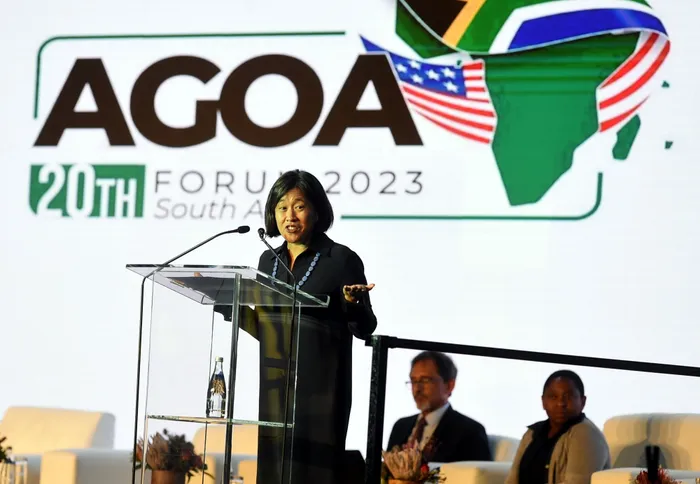Trump’s victory no cause to celebrate for Africa’s growth and development

US Trade Representative Katherine Tai delivering her closing remarks during the 20th African Growth and Opportunity Act (AGOA) Forum held at the Nasrec Expo Centre on November 4, 2023. African leaders including South African, Kenyan, Zambian, Rwandan and Zimbabwean presidents among others were quick to dispatch their congratulatory messages to the US President-elect Donald Trump on social media. If Trump does not change his position in his second presidency, then Africa’s development prospects will be dimmed, says the writer. Picture: Itumeleng English / Independent Newspapers
Dr. David Monyae
Donald Trump’s second coming has been confirmed. In the recent US elections, Trump secured a landslide victory, winning the electoral college and popular vote against Vice President Kamala Harris.
He is on course to win over 300 electoral college votes, way above the threshold of 270 required to win the White House. Vice President Harris and President Joe Biden have already conceded defeat and committed to an orderly and smooth transfer of power. It looks like this time around Trump will come back with even more power with the Republicans having secured a Senate majority with 53 out of 100 seats thus far and widely expected to add to their tally.
The House of Representatives results also seem to be going the Republicans’ way as the party is edging closer to clinching the majority with 211 seats so far against the Democratic Party’s 199 seats. A party needs 218 seats to have the majority. With 6 Republican-appointed US Supreme Court justices, Trump is set to effectively control the executive, legislature, and judiciary. As such, it seems the world, including Africa, should be prepared to deal with what will truly be a Trump’s America.
African leaders including South African, Kenyan, Zambian, Rwandan and Zimbabwean presidents among others were quick to dispatch their congratulatory messages to the US President-elect Donald Trump on social media. They all pledged to work with the Trump administration in pursuit of mutual interests.
These seemingly merry-go-round well-wishes come from a keen understanding and appreciation of the far-reaching implications a Trump presidency can potentially have for Africa’s economic and development trajectory. Perhaps the first item on the agenda of US-Africa relations when Trump moves into the White House in January will be the future of the Africa Growth and Opportunity Act (AGOA which is still up in the air as it expires in 2025.
AGOA is important to African economies which have exported an annual average of over US$10 billion under the arrangement over the last decade. The trade scheme has enjoyed bipartisan support in the US legislature which improves its chances of renewal even under a Trump presidency with a Republican-dominated legislature.
In April, a bi-partisan team of Republican and Democratic senators introduced the AGOA Renewal and Improvement Act which sought to extend AGOA by 16 years to 2041. This was informed by the need to give businesses that intend to invest and export from Africa some level of certainty.
Other aims of the improved programme include streamlining the eligibility review process, supporting the development of intra-African supply chains, and improving African countries’ utilization of the programme. It is unlikely that the Trump administration will find anything profoundly objectionable in this draft legislation. The fact that the programme will promote US investments in Africa while at the same time advancing the country’s geopolitical interests in Africa makes it consistent with Trump’s America First policy. As such, it is highly likely to be renewed.
The legacy of Trump’s first administration in Africa includes the Prosper Africa Initiative and the establishment of the International Development Finance Corporation (DFC).
The Prosper Africa initiative was aimed at boosting two-way trade and investment between Africa and the US. This programme is likely to regain prominence in Trump’s second term. To date, the DFC has overseen the disbursement of a total of US$10 billion in funding for infrastructure, agricultural projects, and the empowerment of women.
Although Trump never personally talked about these initiatives, his second administration will find them valuable in Washington’s efforts to contain China’s growing global influence. Further, Trump’s second presidency coincides with the raging Russia-Ukraine and Israeli-Palestine wars that have divided the world. These wars, especially the Russia-Ukraine war, have had a devastating impact on Africa’s economic prospects through the disruption of critical supply chains. Although Trump has promised to end the wars, he has not proposed any detailed plan as to how he will do that.
Africa has generally withheld its support of US policies on both conflicts with some countries like South Africa even overtly opposing Washington’s position. One wonders whether and how Trump will try to mobilize African support when his administration deals with the two conflicts that threaten global stability and security. Another key issue is that of the reform of the United Nations Security Council (UNSC). Africa and other developing regions have long demanded permanent representation in the UNSC without any success. This cannot be achieved without the support of the US.
The Biden administration had proposed that Africa be granted permanent seats in the UN’s most powerful organ but without the veto power – a proposal which was roundly rejected in Africa. It will be interesting to watch how Trump approaches the matter.
Moreover, Trump is well known for his disdain for multilateral institutions which developing countries have used as platforms to advance their interests. During his first administration, Trump threatened to defund the United Nations Population Fund (UNFPA), the World Health Organization (WHO), UNAIDS, and the UN Peacekeeping all of which play an important role in Africa.
If Trump does not change his position in his second presidency, then Africa’s development prospects will be dimmed.
* Dr. David Monyae is the Director of the Centre for Africa-China Studies at the University of Johannesburg.
** The views expressed in this article do not necessarily reflect the views of The African.